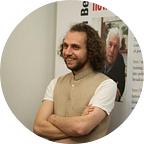Clarity for Teachers: Day 28
‘Doing things you don’t need to do makes it harder to do the things you need to do.’
The psychologist Abraham Maslow is famous for his ‘Hierarchy of Needs’. Even if you never studied psychology, there’s a good chance you’ve met some version of that pyramid — founded on the physiological needs and moving up through safety, belonging and esteem to the goal of ‘self-actualisation’. In fact, if you ever heard anyone talk about self-actualisation, then Maslow’s humanistic psychology was there in the background.
It turns out that Maslow took his pyramid from the Blackfoot nation, inspired by a summer he spent with anthropologist friends on the reservation in Alberta in the 1930s, at a point when he’d been ‘stuck on his developmental theory’. Only according to the Blackfoot, he got things upside down: in the hierarchy depicted on their tipis, the images corresponding to self-actualisation form the bottom layer, followed by community-actualisation, and finally cultural perpetuity.
That story comes to mind because today’s card raises a question: how do I know what I need to do?
I gave one answer yesterday: notice the other needs that could interfere with my discernment, then still myself enough to notice what is needed. That’s a way of thinking that is more concerned with depth than with ascent. It assumes that whatever experience I have of individual existence rests on top of something more interconnected. There are deeper currents, needs which don’t belong so much to my individual self, as to something larger of which I am a part.
That holds for today’s advice, I’d say — but another thread that leads from the same question has to do with noticing that my ‘needs’ always start out as cultural constructs. My old friend Vinay Gupta created a tool for Simple Critical Infrastructure Mapping that starts by mapping the ‘Six Ways to Die’ — you can die because you’re too hot, too cold, hungry, thirsty, sick or injured. That pretty much covers all the things that will kill you, and in that sense it is also a map of your basic needs, the things that you or any other human creature needs to keep you alive, the things that need taking care of in a crisis. And as it stands, this map lies beyond culture: like Maslow’s baseline of physiological needs, it defines the bodily requirements of the human animal.
Yet culture is a tricky thing. Brian Eno has a nice definition of it: ‘Culture is everything we don’t have to do.’ It is whatever is unnecessary. We have to eat, but we don’t have to eat cheeseburgers, or saag aloo, or steak and kidney pie. And here’s the trick — in the abstract, it’s possible to separate out the basic animal needs from the specific cultural forms, only we don’t live in the abstract.
A friend arrives for dinner. I’ve been cooking, not terribly successfully, and I serve him up a plate of the results. ‘What do you call this?’ he asks me, cautiously. ‘Food!’ I say, not wanting to make any greater promise than that, and we both laugh. The joke is that you can’t go into a restaurant and order ‘Food’, and you won’t find a recipe for ‘Food’ in the recipe book. As soon as we return from abstraction to the world in which we meet our needs, or have them met — or don’t — the necessary and the unnecessary turn out to be inseparable. There’s no getting out of culture.
In his extraordinary book Lean Logic, David Fleming up-ends the logic of hair-shirt environmentalism, most famously encapsulated by Gandhi: ‘The world has enough for everyone’s needs, but not for everyone’s greed.’ According to Fleming, this axiom becomes misleading, because human desires are mostly quite humble, whereas most of our ecological impact arises from the needs our societies have produced. The car adverts may be full of seductive imagery, but most of the miles that we drive and the hours we spend in traffic feel like a necessary evil — most drivers need their car in order to get to work, to take the kids to school, to participate in the economy of a car-shaped world. It’s not human desire that is insidious, Fleming argues, but the capacity to produce new needs — needs that are socially produced, but take on a compelling material reality as our cities get rebuilt or our laws and regulations rewritten around them.
I’ve owned a car for two months out of the 42 years of my life. Not owning a car is partly a privilege, partly a choice that has costs associated. (The two months were when I was selling books in Sacramento and soon realised the near-impossibility of navigating that city in high summer on a bicycle.)
So within the layers of this advice, there’s something for me about bringing my needs into question and asking where they come from, what my life would look like — what it would need to look like — if I were to decide that I didn’t need to do this, or own that? What else might become possible as a result?
Västerås, 9 April, 2020
This is the twenty-eighth in a series of commentaries on ‘A teacher’s advice on how to be clear’, Charlie Davies’s reworking of the 1000-year-old Buddhist text, ‘Advice from Atisha’s Heart’. I’m writing these as I take part in Clarity for Teachers, a course that Charlie is leading. You can find out more on the How To Be Clear website.
